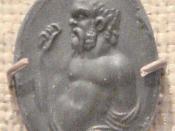Crito
This dialogue between Socrates and Crito concerns civil disobedience. Crito has many compelling reasons with which he tries to convince Socrates to agree with the plan to escape his approaching death. Though Crito's proposition is tempting, Socrates chooses to fulfill his obligation to the state, even to death.
This dialogue is mainly Socrates beliefs and reasons for his behavior. Socrates lays a solid foundation upon which he explains his obligation to abide by the laws. The foundation is composed of public opinion, doing wrong, and fulfillment of one's obligations. Addressing public opinion, Socrates boldly asserts that it is more important to follow the advice of the wise and live well than to abide by the ignorant public opinion and live poorly. Next, he states his beliefs on crime. They both consent to the idea that: under no circumstances, should one do a wrong or injury, even in retaliation.
The last foundation to be questioned is the fulfillment of one's obligations. Both of the philosophers affirm that, provided that the conditions one consents to are legitimate, one is compelled to fulfill those covenants. These each are founded upon right reasoning and do provide a justifiable foundation to discredit any design of dissent.
At line fifty, Socrates executes these foundations to destroy and make untenable the petition that he may rightfully dissent:
Then consider the logical consequence. If we leave this place without first persuading the state to let us go, are we or are we not doing an injury, and doing it in a quarter where it is least justifiable? Are we or are we not abiding by our just greements?
Socrates then concludes that no one should let anything supercede justice, not even ones family.


